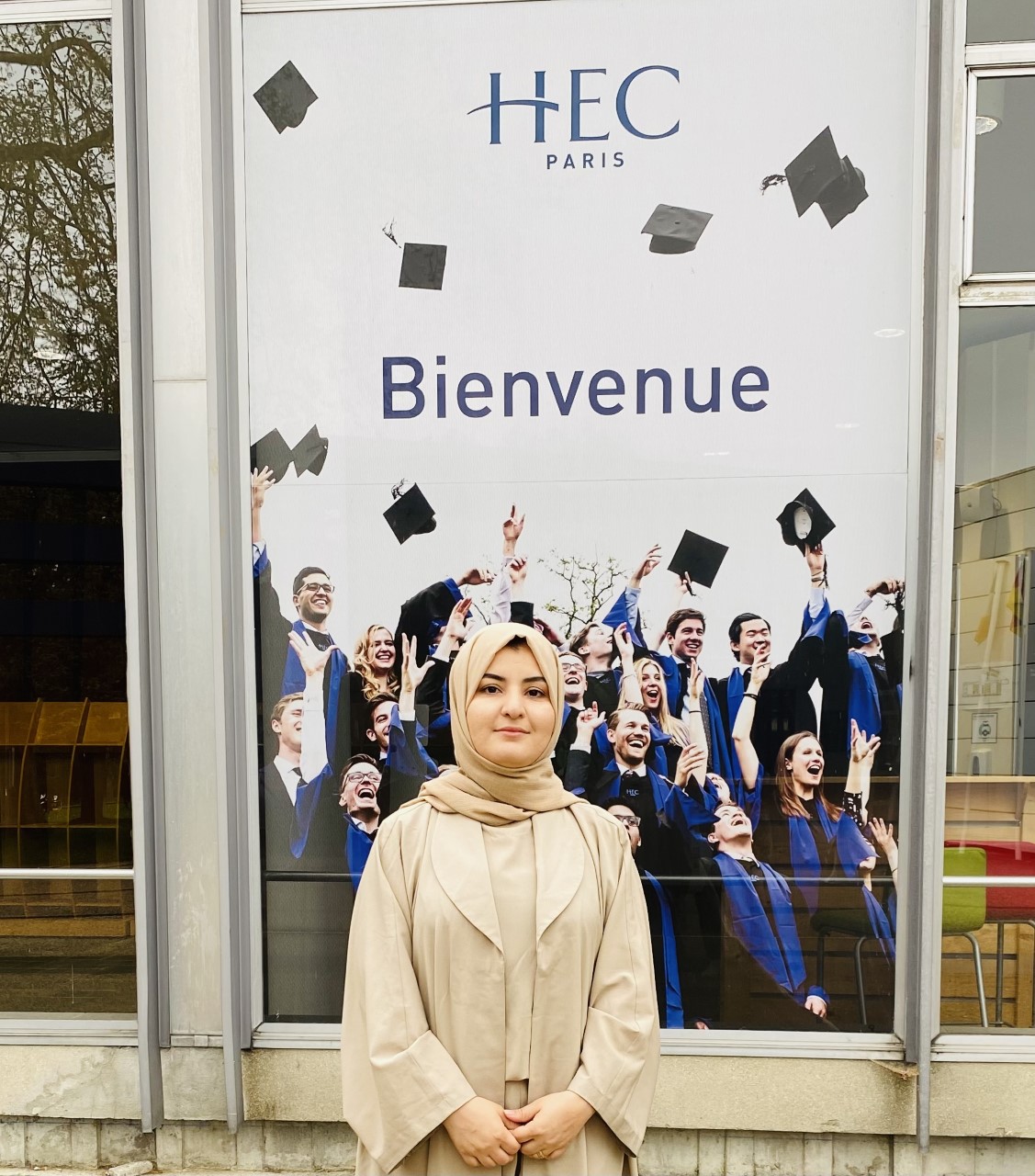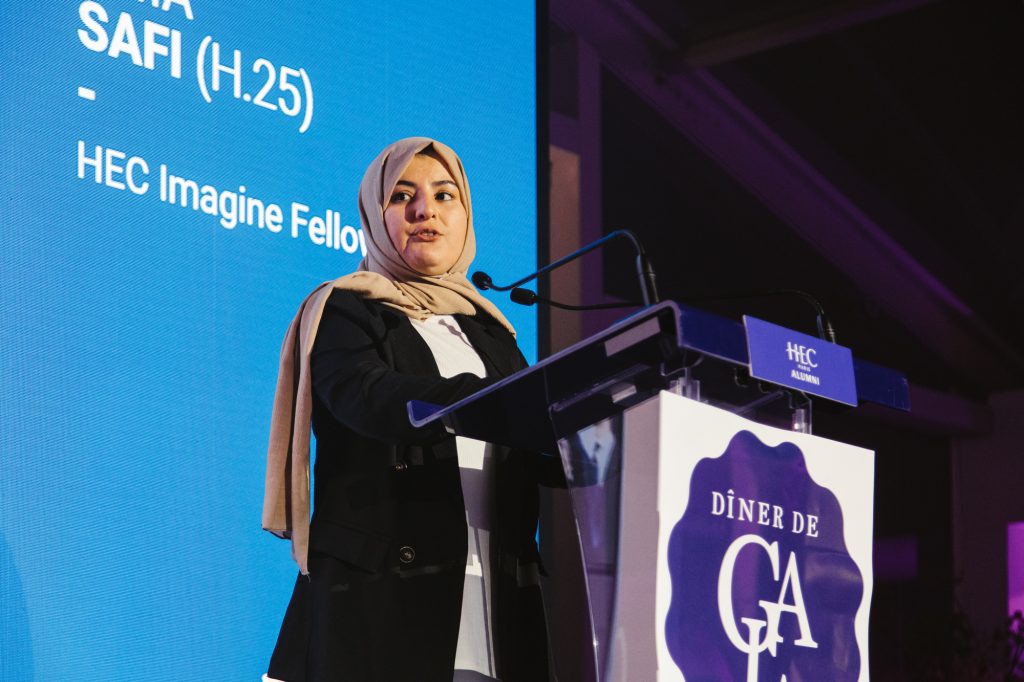Lima Safi – Resilience made in Afghanistan

Born in the province of Helmand, southern Afghanistan, Lima Safi, 27, is a bright student who followed her passion for education despite her country being torn apart. Now one of the five students selected for the Imagine Fellows Scholarship program, she told HEC Stories about her rollercoaster ride from Kabul to Jouy-en-Josas.
When Kabul fell to the Taliban back in August 2021, this overachiever by nature already had a Bachelor in English Literature and a law degree, a job, a salary, and most importantly, her independence. « I was adding to my household income. I was supporting my father and my brother in terms of finance. But after the Taliban’s arrival, I just ended up with nothing. », says Lima Safi, her voice shaking with sorrow and anger. One thing would soon get Lima out of being confined to her home: relentlessly applying for a master’s degree in France.
Her passion for learning is deeply rooted in her upbringings. Education is a core value in her family, one that would later seal her destiny. “I have seven sisters and one brother, but my father is a very open-minded person. He is in favor of girls’ education.” In 2003, when Lima was 5 years old, her father made all the family move from Helmand, a rural province, to the big city of Kabul so his eight daughters and only son could have access to universities.
A working girl confined to her home
Initially homeschooled, the little girl brilliantly passed all the classes and later got admitted as a student by the English Literature Faculty at Kabul Education University. Pursuing a second bachelor, she managed to get a scholarship from the US Embassy for the American University of Afghanistan, where she studied law. All of this working a full-time job as an HR officer at a financial institution, Mutahid Finance Institution in Kabul.
Two years ago, things changed overnight. Women were stripped of their rights to study and move around as they pleased. « My mother had high blood pressure and the doctor said she should exercise outside of the house, in the fresh air. But women are not allowed in parks. They have rockets, so people are afraid and cannot do anything. »
A learning institute for women
Her reaction was to to join forces with other women in a similar situation, educated but forced out of unemployment, to create her own learning institute. Taking great risks, she welcomed about fifty girls to her house and taught English while other ladies taught tailoring and traditional embroidery, khamak, in Pashtun, so the girls could add to their household income. In parallel, Lima started applying to programs and scholarships online. She was able to establish a contact with the admission team of HEC Paris and ended up with an offer in early 2022.
That’s when the Imagine Fellows program came into the picture. Launched thanks to a donation by tech entrepreneur Adrien Nussembaum, co-founder of Mirakl, this scholarship is intended for students from war-torn countries and aims to create leaders who will help restore hope and stability in their homelands. After a few interviews, the team decided to support Lima. “For me, it was like most beautiful feeling ever.” But things weren’t meant to be that easy.
“They searched every corner of my house”
The brutality of the ruling regime caught up with her. Her narration paced by stress and emotion, Lima precisely recalls the day soldiers stormed her place. “They just searched every corner of my house. My passport got seized by the Taliban because of my background at the American University of Afghanistan. Also, my father-in-law was the governor of Helmand in the previous government. Because of that, they could easily locate me.” Accused of being a spy for the American government, Lima was left without a passport and unable to leave the territory. She had no choice but to bribe someone 1500$ to get her document back.
After having shared the good news with HEC, another problem arises: getting a visa. With a passport on the verge of expiring, she had to make quick moves. As France wouldn’t issue visas online, her only option was to transit through Pakistan. Another costly bribe later, she escaped. “Crossing the border from Afghanistan to Pakistan was the most difficult journey of my life.” On February 23rd, she finally board on a flight to Paris. “I had just left my whole family, but I was happy because I was finally on my journey to get my master and my education on track.”

Lima giving a speech at HEC’s Gala 2023. © Christopher Salgadinho
“I would love to go back”
Lima now lives in the dorms, building G, and has apparently been adapting pretty well. « People here are so respectful and supportive. They respect your views no matter what your appearance or your religion is, and that’s what I like. » She attends courses in Supply Chain Management, Managing Organizational Performance and Strategy, and decided to specialize in the latter.
Today, most of her family is still in Afghanistan and Lima only have news once or twice a week through Whatsapp. « I don’t know how when I will be able to see them. » Despite the pain induced by the situation, Lima remains positive about potentially coming back to her homeland. “If the situation gets better, I would love to go back to Afghanistan and share whatever I have with women, and work for women education.”
Education, a symbol of hope
Last month, Lima attended HEC’s Gala and got on stage alongside Adrien Nussenbaum to share her story facing hundreds of alumni and guests. “Arriving at HEC Paris marked the beginning of a remarkable journey which will ignite my passion to make positive impact in the world”, she stated. “Education is a symbol of hope and resilience. For all Afghan women who face similar challenges in their pursuit of education, I encourage them to keep moving forward, never give up on your fundamental rights, with determination and hard work, anything is possible.” Her words resonated under the marquee set in the Rodin museum’s magical gardens and left the audience speechless. Far, far away from Kabul’s tumult.
Published by Estel Plagué

